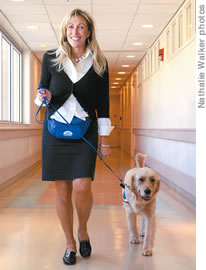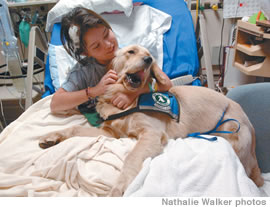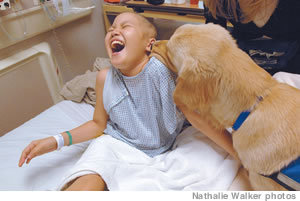Good Dog, Tucker
A new program at Kapiolani Medical Center provides seriously ill children with a loving golden retriever named Tucker, who raises their spirits along with the staff’s

By .(JavaScript must be enabled to view this email address)
E-mail this story | Print this page | Archive | RSS

Ellie Taft-Reinebold with Tucker
Tucker is probably the best worker any boss could ask for. He’s good at his job, he’s friendly and he won’t hound you for a raise. In fact, he doesn’t even get paid.
Oh, and he’s pretty cute too. Tucker, a 1-and-a-half-year-old golden retriever, has joined the staff at Kapiolani Medical Center for Women and Children full time, spending each day with children who have suffered major trauma, abuse or have life-threatening illnesses.
He’s been on the job less than three weeks, and already he’s making a huge impact on both patients and employees.
“I like Tucker because he’s funny and nice,” says 10-year-old Tishelle Hepa, who was diagnosed with acute lymphocetic leukemia last March. “When I see him, I feel happy and excited. My favorite thing to do with him is to give him treats. He doesn’t grab it away from your hand. He takes it gently.”
Tishelle’s mom Trinette says she likes that Tucker doesn’t slobber. “Tishelle loves animals,” she continues. “In the hospital, all they do is tests, so it’s nice to have Tucker here because it gives her a chance to not think about what’s going on.”
Research studies have proven that having animals in a clinical setting can improve mental health and decrease healing time. And the staff at Kapiolani Medical Center can attest to that.
“We have a very solemn, quiet 4-year-old patient who has been receiving chemotherapy treatment for several weeks,” says Ellie Taft-Reinebold, a pediatric nurse practitioner who has voluntarily opened her home to Tucker. “The nurses and doctors have tried everything except standing on their heads to get him to talk or smile. Then we brought Tucker in. In two seconds, the boy’s face lit up, he reached out to pet Tucker and said “dog” in his native Samoan language.

Oh, Tucker, that tickles! says Tishelle Hepa
“The nurses, many who had tears in their eyes at the sight of their now smiling and engaged patient, were awestruck at Tucker’s profound effect on the boy. He did in two seconds what they had been trying to do for days.”
Tucker was donated by Hawaii Canines for Independence (HCI), a non-profit organization based on Maui that provides service dogs for the entire state. He serves in the hospital’s new Animal-Assisted Therapy Program, focusing on pediatric rehabilitation therapy and social therapy.
He and Simba, a golden retriever at Rehabilitation Hospital of the Pacific, are believed to be the first facility dogs in Hawaii to be working in hospitals full-time.
“While Kapiolani Medical Center has had pet visits in the past, Tucker’s five-days-a-week presence will be significantly different,” says Keala Peters, director of communications and donor relations for Hawaii Pacific Health-Philanthropy. “For seriously ill children who often spend weeks in the hospital, Tucker’s daily visits will become a source of solace and comfort.”
Tucker received more than a year of training before joining the Kapiolani team on Feb. 9. His handlers, Taft-Reinebold and Kapiolani Medical Center physical therapist Kelly Yim, also received extensive Animal-Assisted Therapy training from HCI.
So far, Tucker has learned 70 commands, including:
* Visit (Tucker gently places his head on a patient’s lap)
* Snuggle (If a patient is in a wheelchair, Tucker will lay his head across their lap. If a patient is in a bed, Tucker will step up onto a chair and then place his head on their shoulder.)

Tucker visits with Sierra Whiteside
* Brace (Tucker wears a special harness that allows a child receiving physical therapy to stand and hold onto Tucker. He then takes one step and stops, allowing the child to walk along slowly while maintaining balance.)
* Stand Stay (Tucker simply stands still, and the physical therapist will encourage the child to reach out and pet Tucker.)
Tucker’s day begins with a morning run in Waimanalo with Taft-Reinebold. At 7 a.m., he arrives at Kapiolani Medical Center and immediately visits patients in the Pediatric Intensive Care Unit, followed by visits to the Pediatric Ambulatory Unit where children are receiving chemotherapy, and then to two other pediatric units (Carter and Wilcox).
Then, it’s time for a puppy nap in chief operating officer Martha Smith’s office, where a doggie bed has been set up.
Throughout the rest of the day, he continues patient visits and then is active in the Physical Therapy Department, motivating patients to perform physical movements that increase flexibility, strength and muscle memory.
“A 7-year-old Kapiolani patient is recovering from a brain injury and is partially paralyzed on her right side,” says Taft-Reinebold. “So, to help her regain use of her muscles, physical therapist Kelly Yim has the child groom Tucker during therapy. Since the patient is unable to grasp a brush, she wears a special grooming mitt. And she is much more motivated to make this motion because of Tucker.”
The Kapiolani team plans to formally welcome Tucker to the hospital with a puppy shower this week where he is expected to receive many much-needed things such as a new bed, feeding bowl and lots of squeaky toys.
While Tucker and his training have been generously provided by HCI, other costs the hospital will incur for its new Animal-Assisted Therapy Program are supported by the Kapiolani Health Foundation through an anonymous donor.
“Tucker is so cute,” says 11-year-old Sierra Whiteside, who has hydrocephaly and spina bifida and consequently is paraplegic. “I love it when Tucker comes to see me because he makes me happy. He makes it kind of not so boring because when I’m here, I’m in a bed all day.
“When he’s here I like to pet him and play with him.”
Sierra, who was scheduled for surgery, said she felt OK about the procedure because she was told that she would get to see Tucker right after it was done. She also recently learned that she will get a service dog from HCI that coincidentally is one of Tucker’s brothers.
At the end of the day, Tucker may not get a paycheck for his job well done. But he does get free room and board, and, of course, a lot of love from his new owner, Taft-Reinebold, who also receives no compensation for taking in the lovable retriever. Tucker’s food, veterinary bills and other daily necessities will be paid out of her own pocket.
“HCI felt that Tucker would be a perfect facility dog because he was so wonderful with children,” says Taft-Reinebold, whose husband (University of Hawaii football coach Jeff Reinebold) and children are all enjoying the new furry addition in their family. “But they wanted Tucker to have a family environment on his non-work hours and have a normal puppy life, so he can be recharged and refreshed for his work with hospitalized children.
“As everyone knows, dogs are very sensitive and tune in to the emotional tone of the people and situations that surround them. Tucker is very sensitive, especially to children. And hospitalization for children is naturally very stressful.”
Page 1 of 1 pages for this story
E-mail this story | Print this page | Comments (0) | Archive | RSS
Most Recent Comment(s):








